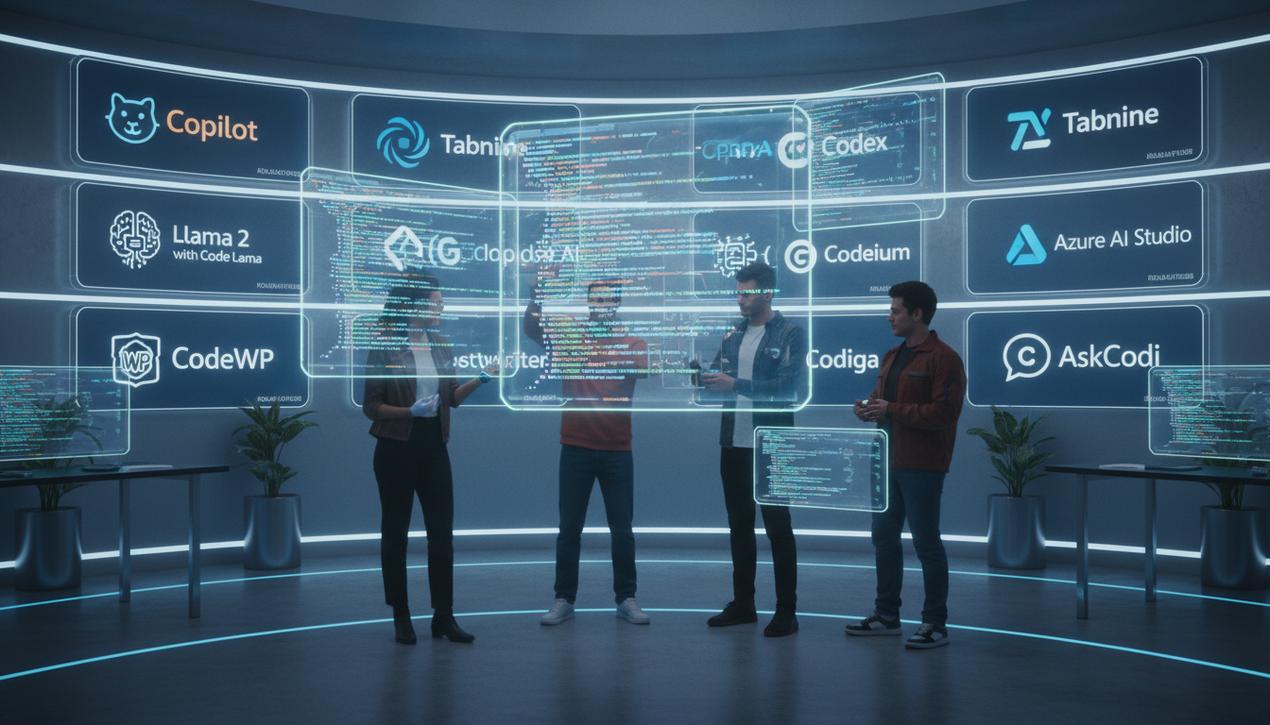Top 12 AI Code Generators to Boost Productivity in 2025


Artificial intelligence has transitioned from a technological curiosity to an indispensable partner in the world of software development. AI code generators, in particular, have sparked a revolution, radically transforming how developers design, write, and debug programs. The latest statistics are compelling: an estimated 92% of developers are already using AI coding assistants, and these tools enable them to write code up to 55% faster. The market for AI in software development, valued in the billions, is projected to experience exponential growth, confirming this is a lasting trend, not a fleeting one. From simple code suggestions to generating complex scripts from natural language, these tools are no longer gadgets but powerful productivity multipliers. This comprehensive guide introduces the 12 best AI code generators defining the future of programming in 2025.
How to Choose the Right AI Code Generator
With a rapidly growing number of options, selecting the AI coding assistant that best fits your needs can be challenging. To make an informed choice, it’s crucial to evaluate several objective criteria that will determine the tool’s effectiveness in your daily workflow.
- Supported Programming Languages: Ensure the tool has expert-level mastery of the languages you use most, whether it’s Python, JavaScript, Java, C++, or others. While broad language support is a plus, the depth of knowledge in your primary language is paramount.
- IDE Integration: A seamless developer experience depends on the tool’s integration with your preferred Integrated Development Environment (IDE), such as VS Code, JetBrains (IntelliJ, PyCharm), or Visual Studio. A native, well-designed extension is essential for a fluid workflow.
- Range of Features: Evaluate the breadth of functionalities offered. Does the tool only provide autocompletion, or does it also support generating complete functions, writing unit tests, debugging, optimizing existing code, or even translating code between different languages?
- Security and Code Confidentiality: This is a critical point, especially for enterprise use. Thoroughly review the provider’s policy regarding your code. Is it used to train their models? Are there options available to guarantee the privacy and security of your proprietary data? Research shows that nearly half of AI-generated code can contain security flaws, making this a vital consideration.
- Pricing Model: The offerings vary significantly, from free versions for open-source projects to paid subscriptions for professionals and businesses. Analyze the cost-benefit ratio based on the expected productivity gains and the features provided.
The 12 Most Powerful AI Code Generators of 2025
From tech giants to innovative startups, numerous players are offering powerful solutions to assist developers. Here is a selection of 12 tools that stand out for their performance, integration, and features.
1. GitHub Copilot
Developed by GitHub in partnership with OpenAI, Copilot is arguably the most famous and widely adopted AI code generator. Natively integrated into Visual Studio Code, it excels at providing context-aware code suggestions, ranging from single lines to entire functions. It analyzes existing code and comments to propose relevant solutions in dozens of languages. The price is $10 per month for individuals and $19 per user per month for businesses.
2. Amazon CodeWhisperer
Amazon’s answer to Copilot, CodeWhisperer, is a powerful assistant that stands out for its security features. It can scan generated code to detect potential vulnerabilities and ensure it doesn’t replicate open-source code without the appropriate license. It supports numerous languages, including Python, Java, and JavaScript, and offers a generous free tier for individual developers.
3. Llama 2 (and Code Llama)
Developed by Meta, Llama 2 is an open-source language model with a specialized version, Code Llama, trained specifically for code generation. As a free and accessible model, it represents a powerful and flexible alternative for developers who wish to host and fine-tune their own models. It demonstrates particularly strong performance with Python.
4. Tabnine
Tabnine positions itself as an ultra-fast code autocompletion assistant. It uses AI to predict and suggest the next lines of code in real-time, significantly reducing typing errors. Its unique feature is its ability to learn from your personal coding habits and team repositories to customize its suggestions. Tabnine offers a free plan for freelancers and a paid plan for teams.
5. OpenAI Codex
Codex is the powerful engine that fueled the initial version of GitHub Copilot. Accessible via OpenAI’s API, it is capable of translating natural language into code across more than a dozen programming languages. Its strength lies in its deep understanding of complex requests, allowing it to generate entire scripts from a simple English description. Its pricing is usage-based (per token).
6. Snyk Code (formerly DeepCode AI)
Acquired by the security company Snyk, DeepCode AI has evolved into Snyk Code. It specializes in real-time code review and error detection powered by AI. It analyzes your code as you write, comparing it against a massive knowledge base of open-source projects to identify bugs, performance issues, and security vulnerabilities, offering relevant fixes immediately.
7. Cursor
Cursor is more than a plugin; it’s an AI-native code editor built from the ground up for pair-programming with artificial intelligence. It allows developers to edit, debug, and refactor code using natural language prompts directly within the editor. It can also generate code from scratch and automatically create documentation, making it a comprehensive AI-first development environment.
8. Replit Ghostwriter
Integrated into the Replit online IDE, Ghostwriter is an AI assistant designed to make development faster and more accessible, especially for prototyping and learning. It offers features like “Complete Code,” “Explain Code,” and “Edit Code,” which not only generate code but also help users understand and modify it using natural language instructions.
9. CodeWP
Specifically designed for the WordPress ecosystem, CodeWP is an AI assistant that generates PHP, JS, and WooCommerce queries. It helps WordPress developers create snippets and plugins, and interact with the ecosystem’s APIs much more quickly. A free plan is available to get started.
10. Codiga
Codiga is a real-time static code analysis tool that integrates directly into your IDE. It checks the quality and security of your code as you type, applying customizable rules. It helps teams maintain a clean, secure, and consistent codebase in an automated fashion.
11. Azure AI Studio
Microsoft’s platform for AI development includes powerful code generation tools. Designed for creating AI-based applications, it provides assisted coding features to streamline the work of developers within the Azure ecosystem, integrating seamlessly with other Microsoft services.
12. AskCodi
AskCodi presents itself as a suite of tools for developers. Its chatbot can answer programming questions, generate code, create tests, and even write documentation. It supports a very wide variety of languages and frameworks, with a free offering limited by monthly credits.
Future Trends: Beyond Simple Code Generation
The evolution of AI code generators is not stopping at autocompletion, much like the rapid advances seen in the best AI video generators. Several fundamental trends are poised to redefine the entire software development lifecycle.
- From Text-to-App: The next frontier is generating complete applications from a prompt, a key step in mastering how to create a mobile app. This involves orchestrating the user interface, business logic, and database schema.
- AI in the DevOps Pipeline: Artificial intelligence is being integrated more deeply into the entire DevOps chain. This includes optimizing CI/CD pipelines, predictive monitoring of applications in production, and automating deployment strategies to reduce downtime.
- Autonomous Testing and Debugging: AI is becoming capable of automatically generating relevant test suites, identifying the root cause of bugs, and even proposing validated patches. This drastically reduces the time developers spend on these traditionally manual and time-consuming tasks.
- Legacy Code Refactoring: Modernizing old code is one of the most expensive challenges in development. Specialized AIs are beginning to analyze, document, and automatically rewrite legacy code into more modern languages or architectures, tackling technical debt at scale.
The integration of AI code generators into developer workflows is now an established reality. These tools are much more than simple assistants; they act as true collaborators, boosting productivity, improving code quality, and allowing developers to focus on more complex, creative problems. However, it is essential to use them wisely. The ability to review and understand the generated code remains a fundamental skill to ensure the security, maintainability, and performance of applications. True mastery lies in the synergy between human intelligence and machine efficiency.



